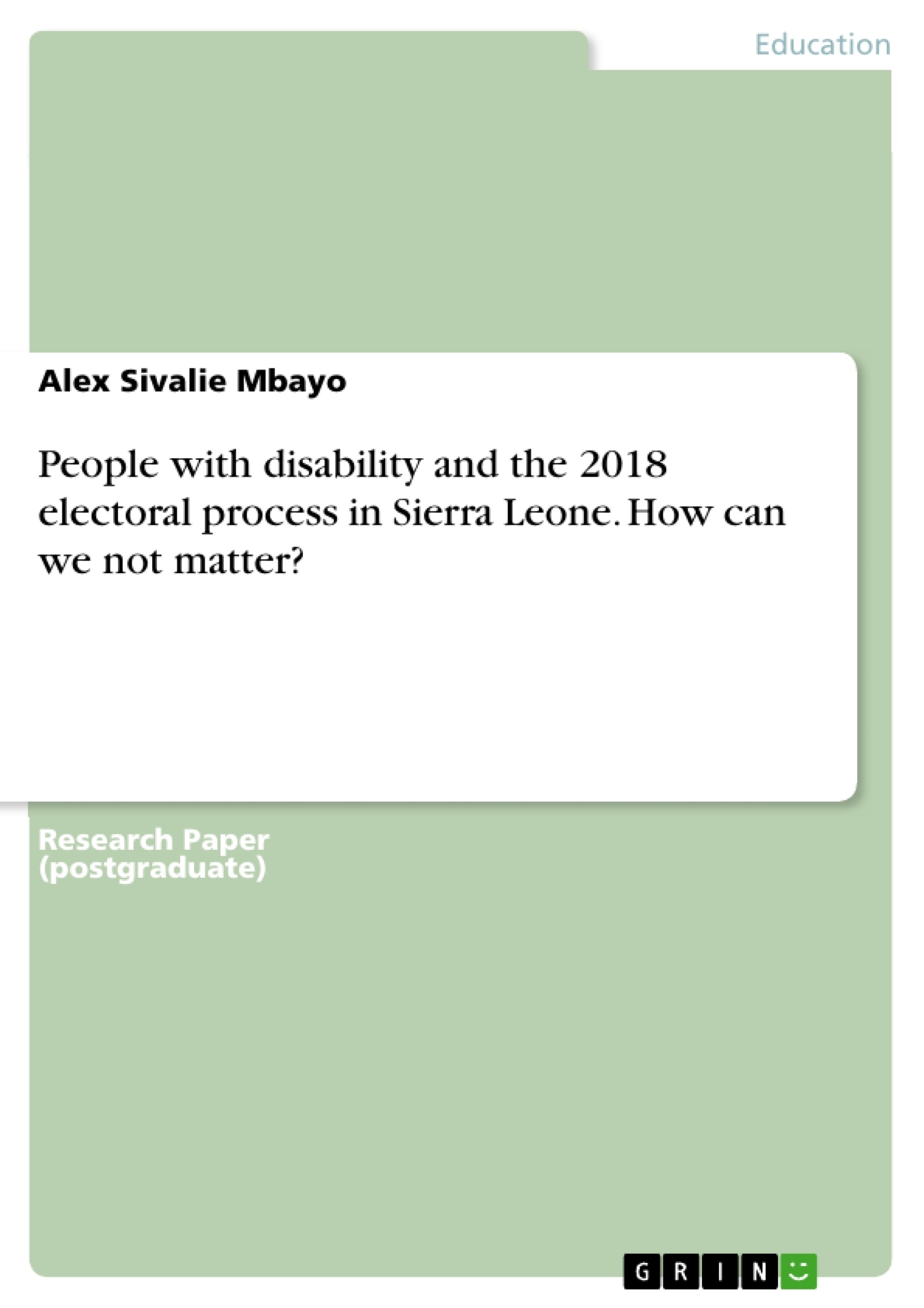This article examines the long standing cultural and politically sensitive issues of discrimination, marginalization, and the violation of the rights of People with Disability (PWD), in relation to political and decision-making processes. It specifically examines the case of Sierra Leone and the prospects and challenges that PWDs faced in the 2018 presidential and general elections. It provides a detailed account of the experiences of PWDs and the prospects and challenges they contended with during the electioneering processes. It also provides perspectives and insights that could help to shape policies related to not only the participation of PWDs in electioneering processes, but also establishing the conducive environment for them to have a voice and place at all levels in society.
Inhaltsverzeichnis (Table of Contents)
- Abstract
- Introduction
- PWDs and Political Participation in Sierra Leone: A Historical Overview
- PWDs and the Struggle for a Place and Recognition within Political Parties
- Business as Usual: PWDs and their participation in the 2018 elections
- Overcoming a Persistent Challenge: Necessary Steps and Actions
- Conclusion
- References
Zielsetzung und Themenschwerpunkte (Objectives and Key Themes)
This article examines the challenges faced by people with disabilities (PWDs) in Sierra Leone during the 2018 presidential and general elections. It explores the historical context of PWDs' exclusion from political participation, highlighting their experiences during the 2018 electioneering process. The article aims to provide insights and recommendations to improve the inclusion and participation of PWDs in future elections and broader societal decision-making.
- The historical exclusion and marginalization of PWDs in Sierra Leone
- The challenges and obstacles faced by PWDs during the 2018 elections
- The need for inclusive policies and practices to ensure equal participation for PWDs
- The importance of creating a conducive environment for PWDs to have a voice and place in society
- The role of international legal frameworks in promoting the rights of PWDs
Zusammenfassung der Kapitel (Chapter Summaries)
- Introduction: This section sets the context for the study, highlighting the importance of political participation for all citizens, particularly PWDs. It outlines the challenges faced by PWDs in accessing their rights, especially in sub-Saharan Africa, and emphasizes the need for research to address these issues.
- PWDs and Political Participation in Sierra Leone: A Historical Overview: This chapter examines the historical context of PWDs' political participation in Sierra Leone, exploring their experiences and the legal frameworks that aim to protect their rights. It highlights the shortcomings of existing systems and structures in facilitating PWDs' participation and the need for stronger legal enforcement and awareness.
- PWDs and the Struggle for a Place and Recognition within Political Parties: This section delves into the challenges faced by PWDs in gaining recognition and participation within political parties. It analyzes the factors that contribute to their exclusion and the need for political parties to actively engage PWDs in their structures and decision-making processes.
- Business as Usual: PWDs and their participation in the 2018 elections: This chapter provides a detailed account of the experiences of PWDs during the 2018 elections in Sierra Leone. It explores the obstacles they encountered, including discrimination, intimidation, and lack of access to facilities and information. It also examines the perspectives of PWDs themselves on their participation in the elections.
Schlüsselwörter (Keywords)
This article focuses on the key themes of disability, democracy, participation, discrimination, intimidation, and marginalization, particularly in relation to the experiences of PWDs in Sierra Leone. The study highlights the need for inclusive and accessible elections, as well as the development of policies and practices that address the unique needs and challenges faced by PWDs in their participation in political processes.
Frequently Asked Questions
What were the main challenges for PWDs in the 2018 Sierra Leone elections?
PWDs faced discrimination, intimidation, lack of accessible voting facilities, and limited access to information during the election process.
How are people with disabilities marginalized in Sierra Leone's politics?
Marginalization occurs through historical exclusion from decision-making, lack of recognition within political parties, and structural barriers in the electoral system.
What is the role of political parties in disability inclusion?
Political parties are often exclusive; the article argues they need to actively engage PWDs in their internal structures and leadership roles.
Are there legal frameworks protecting PWD rights in Sierra Leone?
Yes, legal frameworks exist, but there is a significant gap in enforcement and awareness, leading to continued rights violations.
How can the electoral process be made more inclusive?
Recommendations include creating accessible voting environments, implementing inclusive policies, and ensuring PWDs have a voice at all levels of society.
- Citation du texte
- Alex Sivalie Mbayo (Auteur), People with disability and the 2018 electoral process in Sierra Leone. How can we not matter?, Munich, GRIN Verlag, https://www.grin.com/document/520695



